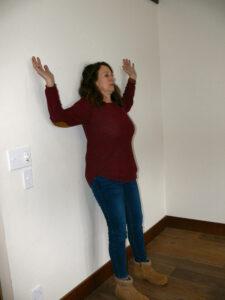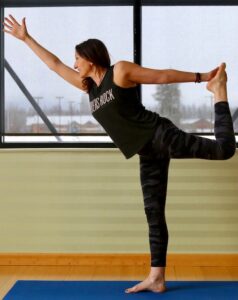By Debbie Burke
Disclaimer: nothing is this article should be construed as medical advice.
Writing can harm the body. Okay, it’s not as bad as logging, or bull riding, or bomb dismantling. But sitting all day hunched over a computer is not a healthy lifestyle.
 Recently I had an enlightening conversation with a chiropractor, Dr. Erika Putnam, shown here consulting with her office manager, Hartty.
Recently I had an enlightening conversation with a chiropractor, Dr. Erika Putnam, shown here consulting with her office manager, Hartty.
Dr. Erika has unique insight into the particular physical problems that beset our profession because she herself is a writer. In addition to her chiropractic practice and operating a yoga studio, she contributed to the Ultimate Guide to Self-Healing Volumes 1-5. She is also working on her memoir and a how-to manual for yoga instructors.
So…I asked her for tips specifically to help writers.
Her overall approach is to develop a “long-term vision of our health and career path.” She says, “Value your wellbeing and work toward preserving that. Think prevention rather than fixing damage.” She believes for optimal health, humans need fresh air, sunshine, the earth…and time away from staring at electronic devices.
People who spend long hours sitting at a computer tend to develop tight chests, tight hip flexors, and are weak in the core and the butt.
What can we do about that?
Here are Dr. Erika’s 10 tips:
- Undo what you do. If you use muscles in the front of the body, you need to counteract by using muscles in the back. Below is a good exercise to undo writer’s slump.

2. Strive for anatomical neutral: This means good posture with shoulders back, head up, chest up, arms at your sides with hands extended. For yoga aficionados, this is similar to mountain pose.
3. Neck care: a head-forward posture is hard on the neck. The farther forward your head is, the more strain on your neck. Sit straight with your head in line with your shoulders and pull your head and chin back. Try the old balance-a-book-on-your-head trick.
4. More Neck Care: At least once an hour, turn your head from side to side, looking over your shoulders.
5. Breathing: When shoulders curl forward, breathing becomes shallow. Take deeper breaths to improve posture. Stretch arms over your head to move/open the ribs to allow deeper breathing. Repeat several times/hour.
6. Neutral spine: When seated, rock your pelvis to find the correct neutral spine posture.
7. Sitting posture: If you sit on the back of the “sit bones,” pressure on the pelvis over time wears out disks in the spine.
Instead, sit up on sit bones. A pillow behind your back may help.
8. Hand care: Typing uses finger flexion which tends to curl hands into claws. To counteract, open your hands, stretch fingers, and press palms together.
9. Get up and move around at least once an hour. Take a walk. Do stretches. Dr. Erika suggests: “Go outside and play with dirt.”
10. I’ll take credit for this tip which came about after my visit with Dr. Erika.
After spending an hour with her, I became much more aware of my posture, standing straighter, shoulders back, chest up, head up. When I got into my car to leave, I noticed the rearview mirror was tilted too low. It had seemed fine while driving to her office. But, after an hour of consciously improving my posture, I realized I now sat a couple of inches taller in the seat. I needed to adjust the mirror upward.
I decided to leave the mirror in the higher position as a reminder to sit up straight.
The more reminders the better.


One final note: Dr. Erika says she can’t back up the following observation with scientific studies but she has frequently noticed that people with a right-side head tilt often have a great deal of left-brain activity.
Here’s a discussion of right brain/left brain from Medical News Today.
JUST FOR FUN — Here’s a totally unscientific experiment to try:
If you’re having problems with plot organization, see what happens if you tilt your head to the right. Does that activate your left (analytical) brain?
If your story needs more feeling, trying tilting your head to the left. Does that activate your intuition and emotion?
Does head tilting make any difference in your thinking process? Please share your results in the comments.
~~~
TKZers: What helps keep your writer’s body in good condition? Do you have favorite exercises?
